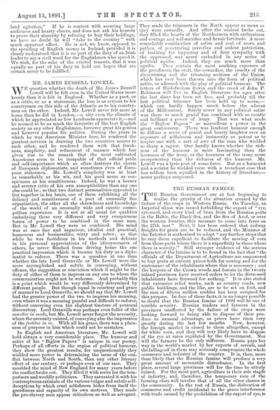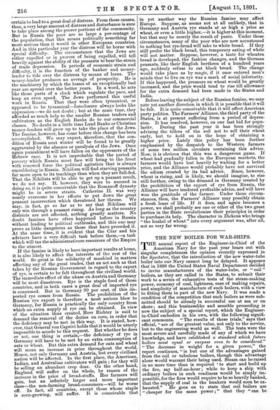THE RUSSIAN FAMINE. T HE Russian Government are at last beginning
to realise the gravity of the situation created by the failure of the crops in Western Russia. On Tuesday, an Imperial ukase was issued forbidding the export of "rye, rye-meal, and every kind of bran from the Russian ports in the Baltic, the Black Sea, and the Sea of Azof, or over the western frontier, this measure to come into force on the 27th inst." Next, it has been ordered that railway freights for grain are to be reduced, and the Minister of the Interior is authorised to adopt "any further steps that he may deem expedient to facilitate the moving of corn from those parts where there is a superfluity to those where there is scarcity." Still stronger evidence of the serious character of the famine is to be found in the fact that "the officials of the Department of Agriculture are empowered to buy grain at current prices both for sowing and for the sustenance of the inhabitants where this is necessary ; and the keepers of the Crown woods and forests in the twenty inland provinces have received orders to let the distressed inhabitants have firewood for nothing." It is also stated that extensive relief works, such as country roads, new public buildings, and the like, are to be set on foot, and the sum of fifteen million roubles has been assigned for this purpose. In face of these facts, it is no longer possible to doubt that the Russian famine of 1891 will be one of terrible severity. Russian traders and farmers in the provinces unaffected by the failure of the crops were looking forward to being able to dispose of their pro- duce to unusual advantage, as prices have risen very greatly during the last few months. Now, however, the foreign market is closed to them altogether, except for white corn, and they will very likely have to dispose of the rye at rates regulated by the Government. Nor will the farmers be the only sufferers. Russia pays her way in the world's market by her exports of cereals, and the falling-off in them may seriously compromise the whole commerce and industry of the country. It is, then, more than likely that the Russian famine will produce a very great amount of mercantile disturbance. In the first place, several large provinces will for the time be utterly ruined. For the most part, agriculture is their sole staple of industry, and, therefore, the temporary ruin of the farming class will involve that of all the other classes in the community. In the rest of Russia, the dislocation of commerce and credit incidental to the grave interference with trade caused by the prohibition of the export of rye, is certain to lead to a great deal of distress. From these causes, then, a very large amount of distress and disturbance is sure to take place among the poorer portions of the community. But in Russia the poor are so large a per-centage of the population, that this means politically something far more serious than it would in other European countries. And in this particular year the distress will be borne with special difficulty. The circumstance that the Jews are either expelled or in process of being expelled, will tell heavily against the ability of the peasants to bear the strain of trade depression. In periods of economic strain and difficulty, it is the function of the banker and money- lender to tide over the distress by means of loans. The money-lender produces an average of prosperity. He is the machinery by which the losses of an exceptionally bad year are spread over the better years. In a word, he acts like those parts of a clock which regulate the pace, and keep an even speed. The Jews performed this useful work in Russia. That they were often tyrannical, or appeared to be tyrannical—foreclosure always looks like oppression—we do not doubt ; but at the same time, they afforded as much help to the smaller Russian traders and cultivators as the English Banks do to our commercial classes. No doubt in a little time Land Banks or Christian money-lenders will grow up to take the place of the Jews. The famine, however, has come before this change has been accomplished. We may expect, therefore, that the con- dition of Russia next winter will be found to be greatly aggravated by the absence or paralysis of the Jews. Once again punishment will have fallen on the oppressors of the Hebrew race. It is not improbable that the period of poverty which Russia must face will bring to the front with renewed force the political agitation that is always smouldering in Russia. Nihilism will find starving peasants far more open to its teachings than when they are full-fed. That the Nihilists will be able to get up a peasant revolt, we do not say. If, however, they were to succeed in doing so, it is quite conceivable that the Romanoff dynasty might be in severe straits. Catherine IL was very nearly overcome in her efforts to put down the great peasant insurrection which threatened her throne. We may, in fact, go so far as to say that Nihilism will only win through a peasant rising. As long as the country districts are not affected, nothing greatly matters. No doubt famines have often happened before in Russia without leading to political outbreaks, and this one may prove as little dangerous as those that have preceded it. At the same time, it is evident that the Czar and his advisers have a very difficult task before them,—a task which will tax the administrativere resources of the Empire to the utmost.
If the famine is likely to have important results at home, it is also likely to affect the interests of the rest of the world. So great is the solidarity of mankind in matters affecting any of the great trades, that an act such as that taken by the Russian Government in regard to the export of rye, is certain to be felt throughout the civilised world. The immediate effect of the ukase on Austria and Germany will be most disastrous. Rye is the staple food of those countries, and in both cases a great deal of imported rye is consumed. But in Germany 90 per cent. of this im- ported rye comes from Russia. The prohibition of the Russian rye export is therefore a most serious blow to Germany, for Russia is practically the only country from which an extra supply of rye can be obtained. In view of the situation thus created, Herr Richter is said to demand the removal of the duties on corn, in order that the deficiency may be met in this way. It is stated, how- ever, that General von Caprivi holds that it would be utterly impossible to accede to this request. But whether he does or not, one thing is certain,—the deficiency of rye in Germany will have to be met by an extra consumption of oats or wheat. But this extra demand for oats and wheat will mean an increase in price throughout the world. Hence, not only Germany and Austria, but every civilised nation will be affected. In the first place, the American, Indian, and Australian cultivators will gain ; for they will be selling an abundant crop dear. On the other hand, England will suffer on the whole, by reason of the increase in the price of bread-stuffs. Her farmers will gain, but an infinitely larger and more important class—the non-farming bread-consumers—will be worse off. In fact, all countries, except those whose staple is corn-growing, will suffer. It is conceivable that in yet another way the Russian famine may affect Europe. Suppose, as seems not at all unlikely, that in Germany and Austria rye stands at as high a price as wheat, or even a little higher,—it is higher at this moment, but that may be merely the result of panic. Under these circumstances, many of the poor who are now accustomed to nothing but rye-bread will take to white bread. If they still prefer the black bread, this temporary eating of white will not matter. Suppose, however, a taste for wheaten bread is developed, the fashion changes, and the German peasants, like their English brethren of a hundred years ago, suddenly refuse to eat black bread. The change would take place as by magic, if it once entered men's minds that to live on rye was a mark of social inferiority. If this happened, the pressure on wheat would be greatly increased, and the price would tend to rise till allowance for the extra demand had been made in the States and India.
Before leaving the subject of the Russian famine, we may note yet another direction in which it is possible that it will be felt. It is quite conceivable that it will affect American party politics. The Farmers' Alliance, the third, party of the States, is at present suffering from a period of depres- sion. It has resolved, however, on one last bid for popu- larity. During the past year it has been strongly advising the tillers of the soil not to sell their wheat early, but to hold on in the hope of obtaining a higher price. Lately this policy has been further emphasised by the despatch to the Western farmers of some two million circulars containing this advice. Now, it is obvious that this was a dangerous game. If wheat had gradually fallen in the European markets, the farmers would have lost heavily by waiting for a better price, and the Alliance would probably have not survived the odium created by its bad advice. Since, however, wheat is rising, and. is likely, we should imagine, to rise still further, owing to the demand in Germany created by the prohibition of the export of rye from Russia, the Alliance will have tendered profitable advice, and will have won the gratitude of the farmer. Under these circum- stances, then, the Farmers' Alliance may possibly obtain a fresh lease of life. If it does, and again becomes a power, we shall probably see one or other of the two great parties in the State revolutionise their principles in order to purchase its help. The character in Dickens who brings "the bushel of wheat" into every argument was, after all, not so very far wrong.



































 Previous page
Previous page